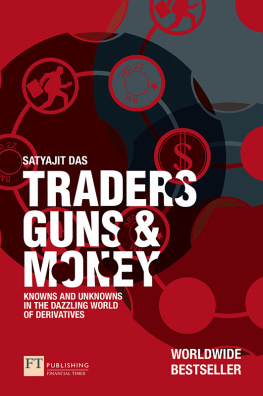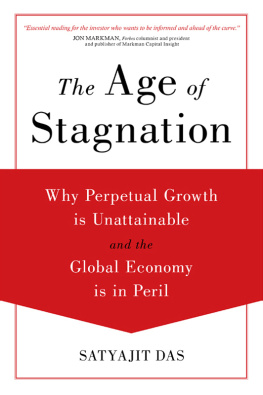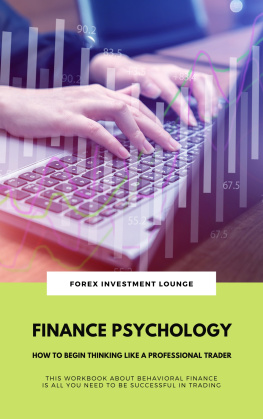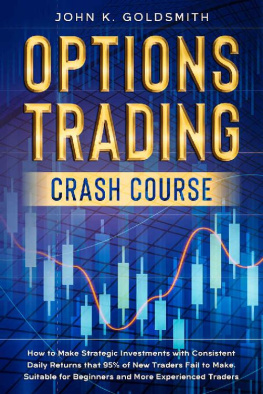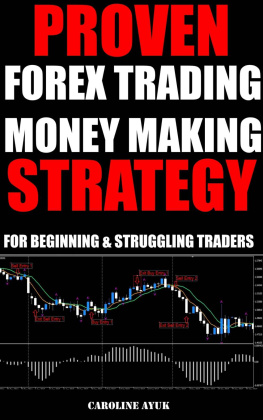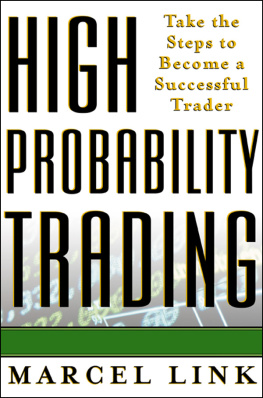Satyajit Das - Traders, Guns and Money, 3rd Edition
Here you can read online Satyajit Das - Traders, Guns and Money, 3rd Edition full text of the book (entire story) in english for free. Download pdf and epub, get meaning, cover and reviews about this ebook. year: 2020, publisher: Pearson Education, genre: Detective and thriller. Description of the work, (preface) as well as reviews are available. Best literature library LitArk.com created for fans of good reading and offers a wide selection of genres:
Romance novel
Science fiction
Adventure
Detective
Science
History
Home and family
Prose
Art
Politics
Computer
Non-fiction
Religion
Business
Children
Humor
Choose a favorite category and find really read worthwhile books. Enjoy immersion in the world of imagination, feel the emotions of the characters or learn something new for yourself, make an fascinating discovery.
- Book:Traders, Guns and Money, 3rd Edition
- Author:
- Publisher:Pearson Education
- Genre:
- Year:2020
- Rating:5 / 5
- Favourites:Add to favourites
- Your mark:
- 100
- 1
- 2
- 3
- 4
- 5
Traders, Guns and Money, 3rd Edition: summary, description and annotation
We offer to read an annotation, description, summary or preface (depends on what the author of the book "Traders, Guns and Money, 3rd Edition" wrote himself). If you haven't found the necessary information about the book — write in the comments, we will try to find it.
Satyajit Das: author's other books
Who wrote Traders, Guns and Money, 3rd Edition? Find out the surname, the name of the author of the book and a list of all author's works by series.
Traders, Guns and Money, 3rd Edition — read online for free the complete book (whole text) full work
Below is the text of the book, divided by pages. System saving the place of the last page read, allows you to conveniently read the book "Traders, Guns and Money, 3rd Edition" online for free, without having to search again every time where you left off. Put a bookmark, and you can go to the page where you finished reading at any time.
Font size:
Interval:
Bookmark:


We are grateful to the following for permission to reproduce copyright material:
Figures
adapted from Hedge Funds: The New Credit Paradigm, Fitch Ratings (Merritt, Roger and Fahey, Eileen)
Tables
adapted from Moodys Investors Services (March 2005) Default and Loss Rates of US CDOs: 19932003 at Figure 10 and Moodys Investors Services (March 2006) Default and Recovery Rates of Corporate Bond Issuers: 19202005 at Exhibit 35.
In some instances we have been unable to trace the owners of copyright material, and we would appreciate any information that would enable us to do so.
Satyajit Das is an international expert on financial derivatives and has over 30 years experience in the financial markets. Having worked both on the sell side and the buy side for banks such as the Commonwealth Bank of Australia, Citicorp Investment Bank, Merrill Lynch and the TNT Group, he now acts as a consultant advising banks and corporations and presenting seminars on derivatives throughout the world.
He is a frequent interviewee and widely quoted in the financial press in the USA, Canada, UK/Europe, South Africa, Australia, New Zealand and Asia. Das is recognised for his capacity to communicate complex financial subjects and trends in simple and non-technical language.
Das is the author of a number of key reference works on derivatives and risk management including Swaps/ Financial Derivatives Library, third edition (John Wiley & Sons, 2005) (a four-volume, 4,200 page reference work for practitioners on derivatives) and Credit Derivatives, CDOs and Structured Credit Products, third edition (Wiley Finance, 2005).
He is also the author (with Jade Novakovic) of In Search of the Pangolin: The Accidental Eco-Tourist (New Holland, 2006).
Traders, Guns & Money: Knowns and Unknowns in the Dazzling World of Derivatives was written over the period 2003 and 2005. First published in early 2006 with a new edition, a revised edition with a new Afterword, dealing with the global financial crisis (GFC) and the role that derivatives and related financial products played in the crisis, was published in 2010.
Originally designed as a record of my experiences in the derivatives industry, the book reflected my concern over developments in financial markets the rapid growth in derivative and financial products; the increase in complex arrangements that were generally not well understood; and, most importantly, the build-up of debt and leverage. My fears unfortunately proved justified.
The GFC is not over and its effects will be felt for decades, as the world slips into a period of slower, more volatile growth as the system tries to digest the excesses of this adventure.
Governments and regulators have done little to bring the wild beast of finance and its most extreme manifestation derivatives under control. Regulatory initiatives reflect Goethes observation that there is nothing more frightening than watching ignorance in action . Activity rather than achievement has been the order of the day. Little has changed and most problems remain unaddressed, setting the stage for future crisis.
In 2009, I wrote that finance still remained about the traders, the guns (Warren Buffetts weapons of mass destruction) and lawyers (who were likely to do well out of the mess). Nothing has changed! Hegel was correct when he noted that the only lesson of history was that no one learned the lessons of history.
Satyajit Das
Sydney, Australia
March 2012
As we know, there are known knowns. There are things we know we know. We also know there are known unknowns. That is to say we know there are some things we do not know. But there are also unknown unknowns, the ones we dont know we dont know.
DONALD RUMSFELD, US SECRETARY OF DEFENSE, 12 FEBRUARY 2002 DEPARTMENT OF DEFENSE NEWS BRIEFING
I was shown into the conference room. It was old-fashioned dark wood panelling, lined with slightly dusty old law reports. Lawyers, especially in England, proudly resist modernity. Modernity in the world of investment banks and dealers means trendy architecture by the latest wunderkind. It manifests itself in acres of glass, steel, marble and uncomfortable chairs. Lucre & Lucre was untouched by these fads. The thickly padded leather chairs were comfortable. It was, I feared, going to be a long meeting.
The clients were already there. There were two of them Indonesians of Chinese extraction. They were part of the infamous bamboo network of ethnic Chinese business interests that criss-crossed South East Asia. I was introduced. We exchanged business cards. I took care to accept the proffered card with both my hands, my body slightly inclined at a respectful angle.
I carefully studied the cards as required by custom. Adewiko President Director was about 50. He was short and dressed in a somewhat ill-fitting designer label suit. He appeared solemn. The other man Budi Titra was younger, no more than 30 I guessed. Budi was the Chief Financial Officer. His card announced that he had an MBA. The younger mans ebullience seemed inconsistent with the seriousness of the matter.
Two people from a Big Four accounting firm were also there. (As I write, the Big Four are PricewaterhouseCoopers; KPMG; Ernst & Young and Deloittes.) It could have been the Big Three this week after a new round of mergers. Andrews, the partner, was a reedy older man with small, intense eyes. There was a junior, relatively innocent looking, who did not introduce himself. He said nothing during the meeting.
The associate from the law firm was there. Albert, call me Albie, everybody does. The partner eventually arrived. Short and with a full figure, Morrison Lucre lumbered into the room. There were more introductions and civilities. Then it was down to business, well almost. Morrison produced four pencils and carefully sharpened each one. He then laid them carefully next to the thick legal writing pad on the table. It took about five or six minutes to complete this activity. At the hourly rates of the professionals present, I calculated that the total cost of pencil sharpening was $2,000 about $500 per pencil. It was truly a Zen moment.
Shall we begin, Morrison intoned. I think it would be helpful to go over the chronology of the transaction, I began. Splendid, Morrison beamed. Everybody presumably was familiar with the transactions, but we were getting paid by the hour.
OCM is a noodle maker? I asked. Yes it was Budis turn to beam. He unleashed a detailed history of the company. The description was punctuated by the occasional detail supplied by Adewiko. It was irrelevant. It was not even interesting. Lets focus on the transactions, I interrupted. Splendid. Yes, lets. It was Morrison.
OCM operates in Indonesia and all its income is in rupiah [the Indonesian currency]? I asked. Budi confirmed it. In 1995, you decided to convert your borrowings into dollars? I continued quickly before Budi could launch another tangential verbal assault. Yes, Budi confirmed. Why? I asked. Cheaper, much cheaper, Budi said. Adewiko nodded his head in silent assent.
What about the currency risk? You have borrowings in dollars but no dollar income. If the dollar rose against the rupiah, then your dollar borrowings would show losses. Did you consider the currency risk? I pressed. No risk, no risk, Budi countered. Why? Rupiah fixed against dollar, no risk, Budi continued. Adewiko nodded. So you assumed there was no risk? No risk, no risk. Budis exasperation at the expert witness me showed. He was contemptuous of my seeming lack of financial acumen on this basic issue.
Font size:
Interval:
Bookmark:
Similar books «Traders, Guns and Money, 3rd Edition»
Look at similar books to Traders, Guns and Money, 3rd Edition. We have selected literature similar in name and meaning in the hope of providing readers with more options to find new, interesting, not yet read works.
Discussion, reviews of the book Traders, Guns and Money, 3rd Edition and just readers' own opinions. Leave your comments, write what you think about the work, its meaning or the main characters. Specify what exactly you liked and what you didn't like, and why you think so.

